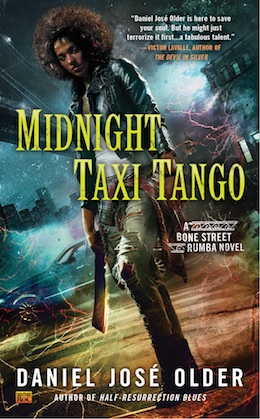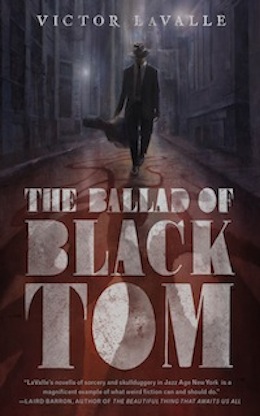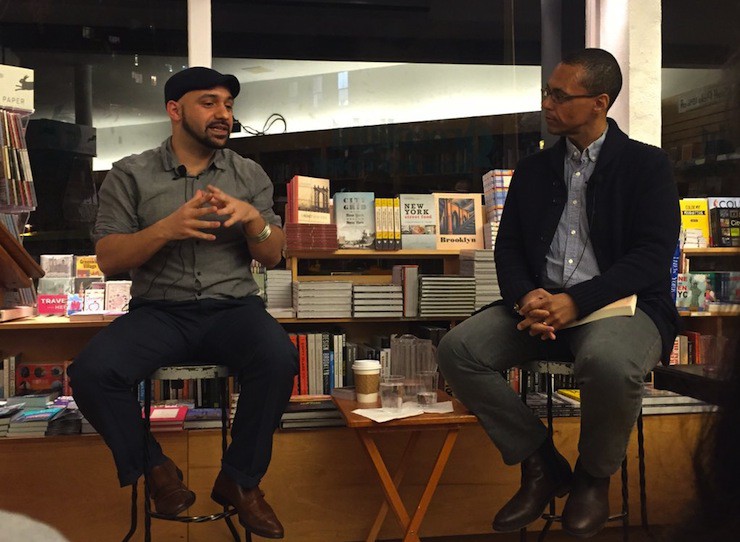Earlier this week, a large and enthusiastic crowd packed Greenlight Bookstore in defiance of freezing temperature and threats of snow. Greenlight hosted a launch party for Midnight Taxi Tango, Daniel José Older’s second novel in the Bone Street Rumba series. But rather than the usual reading-and-wine-soaked-light-conversation that is the centerpiece of most literary events, this party soon became a lively and wide-ranging conversation about race, publishing, and the true legacy of H.P. Lovecraft. Older’s reading was fantastic, but it was his discussion with Victor LaValle, author of The Devil in Silver and the forthcoming The Ballad of Black Tom, that turned the event into one of the best literary nights I’ve ever attended.
Older opened the evening on the right note by quoting Hamilton to loud cheers. Were we ready for a cabinet meeting? Well, perhaps not, but we were more than ready for a reading from Midnight Taxi Tango. Older read two chapters that showed off the range of the book. One was a character sketch, in which “inbetweener” Carlos Delacruz (he works as an intermediary between the living and the dead) investigates some otherworldly business with his friend Kia and her friend Corinna. This section showcases Older’s dialogue, which doesn’t so much pop as jump off the page and slap you to pay attention. The next section was from Kia’s POV, as she’s chased by a ghost. In addition to highlighting Older’s easy command of action and a sense of the supernatural that permeates Brooklyn streets, it also served the most obvious purpose: I really want to know what happens next! And given the line of people who bought books for Older to sign, I think we were all on the same page.
The interview with Victor LaValle was the point when the evening really took off. Well, I say “interview,” but it was really a conversation. Older started off by saying that “when you’re a child, you believe that the writer in the world has to be a disaster.” He cited writers like Hemingway and Fitzgerald who are as well known for their substance abuse issues as for their prose. Older said that meeting other writers of color like LaValle gave him a sense of community that defied those expectations, and the idea that he could define the way he became a writer in the world. He ended his introduction of LaValle by saying, “His writing is so fucking amazing that it’s amazing that I get to talk to him.”
LaValle, for his part, opened by quoting Older’s character Carlos: “‘I take power from my dapper.’ I read that and thought, as another writer, that it’s a way of talking about style and arming yourself as a writer.” Older replied, “I always say I believe in flow. But what does that mean? It’s a way of moving. Everything comes from voice and character, and a lot of the writing happens as I feel out the voices… [writing characters] becomes like hanging out with a friend. Then I have to make the story go somewhere, so we’re not just hanging out all night.” He also said that sometime he gets dressed up to write.
 One of Older’s greatest influences was his decade working as a paramedic. “People misunderstand, they think we’ve let our hearts go cold,” he said. “But this is a large and complicated world, and if you’re out in it you have a different relationship to trauma. Death always wins. When death becomes your daily bread, you have a different relationship to it.” However, he added that his number-one influence is “the way we tell each other stories.”
One of Older’s greatest influences was his decade working as a paramedic. “People misunderstand, they think we’ve let our hearts go cold,” he said. “But this is a large and complicated world, and if you’re out in it you have a different relationship to trauma. Death always wins. When death becomes your daily bread, you have a different relationship to it.” However, he added that his number-one influence is “the way we tell each other stories.”
LaValle asked if Older could have written his books without having worked as a medic. “I don’t think I’d know what it means,” Older responded. “All the mundane things that go on, and at the same time these very real, life-or-death things… like, having to maneuver through an argument between two people while their child is literally dying in front of you.” LaValle built on that, saying, “There’s through line in your work about seeing the worst.” Older agreed, but added that as a paramedic, “There is no through line. People are always trying to see one, but it’s just one disaster after another… fiction is a way to find a beating heart under all that hell.”
LaValle had just come back from the Key West Literary Seminar, and mentioned that another writer talked about the differences between novels and short stories, saying, “Short stories are inherently pessimistic, but novels are inherently optimistic. Stories mirror death, because they have to stop, where, when you read a novel, you leave it with the idea that there’s a world that goes on.” The two discussed whether that might be part of the reason that novels tend to sell better than short stories, but then Older took the idea in a fascinating direction: “I believe in the revolutionary power of happy endings. Especially when you’re dealing with marginalized people… we need to see that there’s hope.”
LaValle continued, “Heartache and genuine loss are the emotional heart of the book. Why was that, for you, the heart?” Older replied, “I didn’t do it intentionally. “When I realized it, I was hoping someone would pick it up. It started with two stories on Tor.com, but it wasn’t in my conscious mind. What I kept thinking was, when we’re telling ghost stories, the question for me becomes why are we haunted. Who is haunting who? And why? What is lost when we lose people? I think there’s a false notion that there’s an end to grief, and I wanted to look at what happens when we don’t allow it to resolve.”
LaValle turned to the audience then, and asked all the writers to raise their hands. I’m not great at math, but I’m going to hazard a guess that 97% of the audience were writers, which encouraged LaValle to ask a question about Older’s writing process: “When you’re working something, are you ever caught off-guard by a theme?”
Older replied that it just felt “like a gift. I’m not an architect, I’m a gardener. Or… I load myself into a cannon? And I shoot myself into the world of the story, and then I can look back and see it, and say, ‘Ah, grief! That was the theme!’” He also advised the writers in the audience to “just tell the fuckin’ story. The layers will emerge.” The writers also offered a fantastic update on the old “kill your darlings” advice that has been the bane of writers for year. Older said that sometimes, when he’s working on essays, he’ll write something and think, “Oh, that line is slammin’… but, oh, it has nothing to do with my point” to which LaValle replied, “So you tweet it!”
Next, the two men jumped into a conversation about The World Fantasy Awards and H.P. Lovecraft. To give everyone context, last year Older created a petition petition to change the World Fantasy Award, which has long been a bust of Lovecraft designed by Gahan Wilson. Over the years many authors, including WFA winner Nnedi Okorafor, have talked about being in the uncomfortable position of being overjoyed to receive an award, only to then confront the fact that you literally have a bust of H.P. Lovecraft, fascinating author/virulent racist, in your home. Older finally created the petition suggesting Octavia Butler as a new bust, and the response was immediate and loud: over 2,500 signed the petition. While we still don’t know what the new award will look like, the WFA took people’s concern to heart and announced that Lovecraft will no longer be the model. Naturally, there was a backlash from die-hard Lovecraftians, and LaValle asked him about that reaction. First, Older made it clear that while he’d received plenty of angry emails, it was Okorafor who got most of the hate mail (a fact that he puts down to his own standing as a cis man) and said, “Racists are very sensitive. Their feelings are so fragile!” He also wanted to make it clear that he’s a fan of the writer, if not his beliefs. “I read Lovecraft, and I enjoy him, but I find him repellent. We’re talking about weaponized literature, where people of color are literally demonized.” He pointed out that “you can topple a giant and still read him” and, rather than focusing on the negative backlash, said that “what was cool was that mad people jumped into the conversation who never thought they could be part of the conversation before. And for me? Fantasy changed within the course of a day.”
 LaValle agreed, saying, “I see [the Lovecraft Mythos] as being the greatest embodiment of white terror. The horror is coming from miscegenation. There are beings that do not care about [the white author] or his power. That’s what makes Lovecraft amazing… but it didn’t occur to him that these mutant half-breed monsters, at some point they will learn to write.” Over the roar of laughter from the audience, Older explained that LaValle’s latest book, The Ballad of Black Tom, is a new take on Lovecraft’s story “The Horror at Red Hook,” which “Victor comes along and says, ‘Well, actually….’ and gives us this human and moving story from the point of view of one of the ‘monsters’ of the story.” He emphasized the idea of this long literary conversation, saying, “This is the era of the clapback. We will use our power not just to be pretty faces but to kick some ass. Midnight Taxi Tango and The Ballad of Black Tom are conversations, told from the perspectives of people who were turned into demons.”
LaValle agreed, saying, “I see [the Lovecraft Mythos] as being the greatest embodiment of white terror. The horror is coming from miscegenation. There are beings that do not care about [the white author] or his power. That’s what makes Lovecraft amazing… but it didn’t occur to him that these mutant half-breed monsters, at some point they will learn to write.” Over the roar of laughter from the audience, Older explained that LaValle’s latest book, The Ballad of Black Tom, is a new take on Lovecraft’s story “The Horror at Red Hook,” which “Victor comes along and says, ‘Well, actually….’ and gives us this human and moving story from the point of view of one of the ‘monsters’ of the story.” He emphasized the idea of this long literary conversation, saying, “This is the era of the clapback. We will use our power not just to be pretty faces but to kick some ass. Midnight Taxi Tango and The Ballad of Black Tom are conversations, told from the perspectives of people who were turned into demons.”
Next LaValle turned to the crowd for audience questions, and hands shot up across the room. The first question was about writing as a person of color in a society that is still friendlier to white voices. LaValle said that whites are now “being made to confront a buried power structure that they didn’t even know existed” and older said added “if we’re going to say “Black Lives Matter” we have to recognize that they’ve always mattered.”
The next question was from another writer who specifically asked how she could tell her stories, and get the mainstream publishing industry to pay attention to them, without having to explain everything that make unique. Hilariously enough, LaValle thought the best answer lay in Lovecraft:
I was thinking about Lovecraft—he was writing stuff no one cared about. Like Melville and Fitzgerald, they were forgotten, failed authors when they died. You have to accept that the world will ignore you, or it will try to destroy you. With Lovecraft—he gets into the Library of America, this great honor, and then like five years later we’re like, “Fuck this guy,” but the good thing about him is that he never compromised. Sometimes you have to go to your grave being misunderstood.
Older agreed, and added, “Publishing is like a small liberal arts college that is like 90% white, and you are going to have to do the racial work, and catch the world up. It’s not fair, but we have to catch the world up.”
Another woman in the audience asked Older about his dedication to writing multifaceted women, and Older’s reply was instantaneous: “’Cause so many men don’t.” He went on, “I try to remember what Junot Díaz said about men writing women: ‘Understand that you suck at it’ and then I try to find a place where the history—the often violent history between men and women—is there, but then still have flow. And then I trust my beta readers to check me. I think that when we write the Other, any Other, the problem is often that we’re not willing to confront the history of our own privilege… it sucks, to deal with that, but then eventually as you work with it the writing becomes fun again.”
Finally a discussion of spirituality delved into another difference between mainstream, zombie-and-vampire-loving culture, and the sorts of stories LaValle and Older write. Older summed it up by saying, “This is why I like ghost stories. It’s no secret that modern white Western culture is obsessed with ghosts being evil, when every other culture loves their dead. I’ll smoke a cigar with my dead. I know that history is an open book, and history is walking with us.”
Leah Schnelbach also believes in the revolutionary power of happy endings. Especially when we live in a world where Death always wins. Tweet at her!










